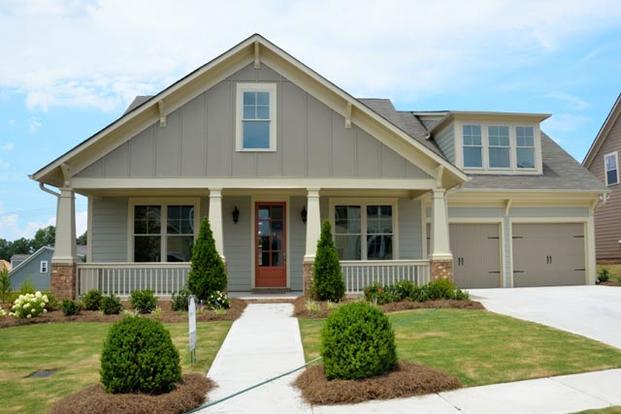If you're wondering, "How does a VA home loan work?", you've come to the right place.
Buying a home for the first time is a major milestone, one that brings excitement, questions and, often, some uncertainty. For veterans, it's also an opportunity to leverage one of the most powerful benefits of military service.
While there are many reasons to buy a home with a Department of Veterans Affairs home loan, first-time homebuyers who qualify for the benefit may enjoy added perks when using their VA home loan entitlement. This is sometimes a veteran's first mortgage -- and possibly their only mortgage.
VA Loan Advantages for First-Time Homebuyers
Buying a first home is one of life's major milestones, and first-time homebuyers in particular may appreciate any savings they can get. The money saved by first-time homebuyers as a result of choosing the VA home loan program over other mortgage types, which require more money up-front, can be put toward moving costs, home improvements or future planning such as college funds and retirement accounts.
No Down Payment Option
Many first-time homebuyers don't have enough savings for a down payment on a home purchase. And first-time homebuyers do not have proceeds from the sale of a prior home to put toward their real estate purchase.
VA home loans allow eligible borrowers to buy a home with as little as zero money down. When compared to most other mortgage programs, which may require 3.5% to 20% cash down, a VA-guaranteed mortgage can help first-time borrowers retain any savings they have for future use.
No Private Mortgage Insurance (PMI)
Because most first-time homebuyers do not have 20% to put down, they will likely be required to pay private mortgage insurance (PMI) if they use a conventional loan program.
This is another reason many first-time borrowers love the VA mortgage program. The VA backs a portion of every VA loan, which eliminates the need for PMI, saving homebuyers hundreds of dollars each month.
Related: 10 Things to Know About VA Loan Eligibility
Flexible Credit Qualifications
For a first-time homebuyer, establishing credit can take time. Many conventional mortgage programs have stringent credit qualifying guidelines. VA qualifying guidelines can be more relaxed. The lender has the flexibility to decide whether the potential VA borrower is a good credit risk. VA-approved lenders consider a borrower's credit, debt-to-income ratio, residual income and other factors.
Ready to start the VA loan process? Read about how to confirm your eligibility for a loan.
Lower VA Funding Fees
Among those who use the VA home loan program, first-time homebuyers are charged the lowest VA funding fee (except for surviving spouses and disabled vets, who are exempt from this fee). Most first-time VA loan users will pay 2.15%.
Common Questions from First-Time Homebuyers
Whether you're transitioning out of the military or settling down after years of service, understanding how VA loans work can help you proceed with confidence.
Will I Have to Make a Down Payment on My First Home?
If you're using a VA loan, the answer is usually no. The VA home loan program is designed to free you of the need for a traditional down payment, thus removing one of the most common barriers to homeownership. This can save you tens of thousands of dollars right off the bat.
Do I Need Perfect Credit to Qualify for a VA Loan?
Perfect credit is not a requirement to secure a VA loan. In fact, one of the advantages of VA loans for first-time homebuyers is that they tend to have some flexibility when it comes to credit. While most lenders prefer a credit score of at least 620, some may approve lower scores depending on your full financial picture.
Lenders also consider your debt-to-income ratio, income stability and your payment history. That means if you've had a few bumps in the road but you have shown responsible financial behavior more recently, you still have a strong chance of qualifying.
Related: VA Loan Tips for Disabled Veterans
Do I Need to Have Cash at Closing?
Even with a zero-down VA loan, you likely will still incur a few costs at or around closing. Sometimes you can roll closing costs into your loan. There are also other ways to reduce or offset out-of-pocket expenses.
One common question is: Who pays closing costs on a VA loan? Typically, the buyer covers most of the closing costs, but the VA allows sellers to contribute a certain percentage of the home's value toward these costs. That means with a strong negotiation or the right market conditions, you might walk away from the closing table having spent very little out of pocket.
How Do I Get the Lowest Interest Rate Possible?
Interest rates make a huge difference for home buyers, not just in your monthly mortgage payment but in the total amount you pay over the life of the loan. So naturally, many buyers want to know: Do you get better rates with a VA loan? The answer is generally yes. VA loans often come with lower interest rates than conventional loans because they are backed by the federal government, which reduces risk for lenders.
To secure the lowest possible rate, it's wise to improve your credit score as much as possible before applying. Shopping around is also essential. Even a difference of half a percentage point can save you thousands of dollars over time.
Related: 5 Things Military Spouses Should Know Before Buying Their First Home
Some buyers also choose to pay points up-front -- a tactic that's sometimes called "buying down the rate" -- which can make sense if you plan to stay in the home long term.
Am I Better off Owning a Home or Renting?
This is a great question, and the answer is, "It depends." Do you plan to stay in the same residence for at least three years? Then buying can start to make sense in many cases. This lets you build equity, provides you with some stability and gives you full control over your living space.
The longer you stay, the better it can be for you financially. Over time, your monthly mortgage payment may remain more or less steady, while by contrast, rents tend to rise.
But let's not ignore that renting still has its perks, especially if you need flexibility. You may be better off renting if you think you'll relocate soon, or if you're just not sure about your long-term plans. Renting may also be better if you don't want to or can't afford to deal with maintenance, repairs, property taxes and insurance costs.
Find a VA Loan
If you're ready to move forward, or just want more information, the first step is to get no-obligation rate quotes.











